While the International Olympic Committee does not give prize money to winners at the Paris Games, many nations and territories offer incentives to their athletes to come home with gold, silver or bronze.
Many are financial, but the rewards can be more eclectic — anything from exemption from compulsory military service to cars, cows, apartments and even free food deliveries.
In South Korea, an Olympic medal, of any color, grants athletes exemption from 18 months of compulsory military service, which all able-bodied males must undertake by the age of 28.
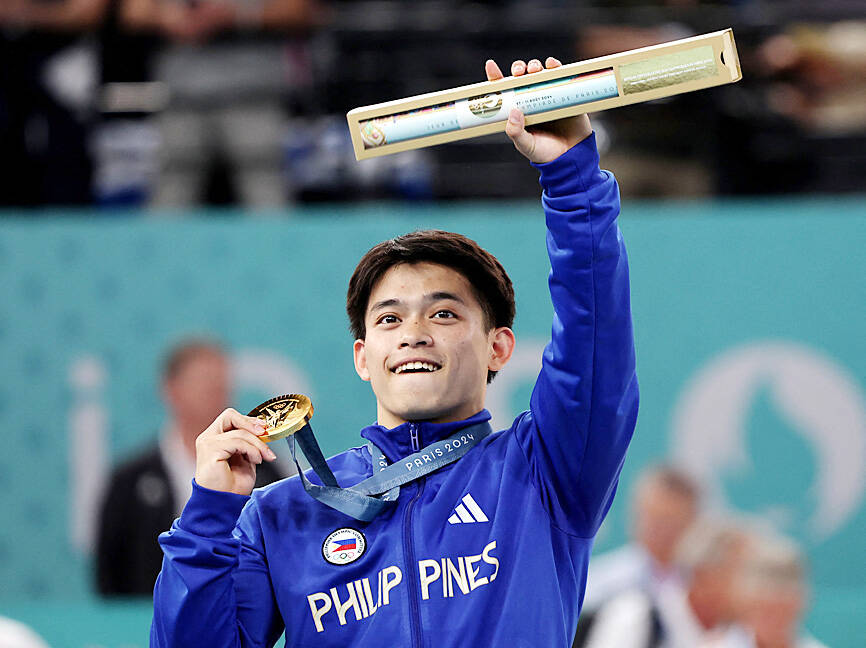
Photo: Reuters
A gold at the Asian Games does the same, which star soccer player Son Heung-min famously achieved at Jakarta in 2018 to avoid his spell in combat fatigues.
The country’s six archers at the Tokyo Games, who claimed four out of five golds, were all given cars by Hyundai, who sponsor the team.
Gold medalists in individual events from Poland receive a cash prize of 250,000 zlotys (US$63,706), a two-room apartment, a diamond, a painting and a holiday voucher.
Silver and bronze medal winners are also generously rewarded with cash and other gifts.
Apriyani Rahayu and Greysia Polii, who won badminton women’s doubles gold at Tokyo three years ago for Indonesia, were reportedly pledged rewards ranging from new houses from a property developer to meatball restaurants from a social media influencer.
Apriyani was also promised five cows, a plot of land and a house by the district head of her hometown in Southeast Sulawesi, state news agency Antara reported.
Another report said that state-owned financial services company PT Pegadaian promised to give the pair 3kg of gold.
Indonesian Minister of Tourism and Creative Economy Sandiaga Uno said they could enjoy free holidays in the country’s five premier tourism destinations.
When Ahmad Abu Ghaush won Jordan’s first-ever gold medal — the men’s 68kg division in taekwondo in Rio de Janeiro in 2016 — the Jordan Olympic Committee gave him 100,000 Jordanian dinars (US$141,105 at the current exchange rate) and his coach about half that.
Abu Ghaush also received many other rewards and gifts from local companies including a car and a luxury watch, while Jordanian King Abdullah II awarded him the First Class Order of Distinction.
Philippine weightlifter Hidilyn Diaz was gifted two properties and a promotion to staff sergeant in the Armed Forces of the Philippines after winning the country’s first-ever gold medal at the Tokyo Olympics.
Philippine Olympic Committee president Abraham Tolentino said he had previously given medalists houses and land at his own expense.
Iraq’s soccer players were each given more than 9 million Iraqi dinars (US$6,935 at the current exchange rate) and a plot of land for qualifying for the Olympics, officials said.
Weightlifter Ali Ammar Yasser received a car and a plot of land after qualifying for the Games, and has been promised US$1 million if he brings home a bronze medal or better.
Malaysia’s first athlete to win an Olympic gold medal in Paris would not be going hungry, with one year’s worth of free food orders promised by delivery and transportation company Grab.
They would also receive a Chery sport utility vehicle (SUV) as well as a luxury apartment from property developer Top Residency, the government said.
When Indian athlete Neeraj Chopra won javelin gold in Tokyo he was promised unlimited free air travel for a year by airline IndiGo and a new seven-seater SUV by a businessman.
After Singapore’s Joseph Schooling made history at the Rio Games by beating the great Michael Phelps to 100m butterfly gold, ride-hailing service Grab offered him and his family free transportation for a year, which he shared with a blind masseur and a para-swimmer. Singapore Airlines chipped in with 1 million air miles, while the government gives S$1 million (US$753,523) for any gold medal.
The Hong Kong government gave Paris gold medal-winning fencers Vivian Kong and Cheung Ka-long lifetime travel tickets for the city’s MTR subway system and promised the same to all other medalists.
The Hong Kong Jockey Club also gives individual gold medalists HK$6 million (US$768,448).
Gymnasium chain Pure is offering lifetime memberships to all 35 Hong Kong athletes competing in Paris and the territory’s Cathay Pacific airline said it would give all medal winners free business class travel for a year.
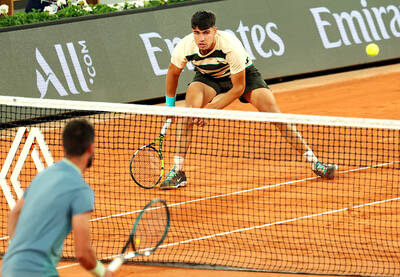
FRUSTRATION: Alcaraz made several unforced errors over four sets against Bosnian Damir Dzumhur, who had never made it past the third round in a major competition Defending champion Carlos Alcaraz reached the fourth round of the French Open after laboring past Damir Dzumhur 6-1, 6-3, 4-6, 6-4 in the Friday night session. The second-seeded Spaniard had never before played Dzumhur, a 33-year-old Bosnian who had never been past the third round at any major tournament. “I suffered quite a lot today,” Alcaraz said. “The first two sets was under control, then he started to play more deeply and more aggressively. It was really difficult for me.” Dzumhur hurt his left knee in a fall in the second round, and had treatment on Friday on his right leg during the
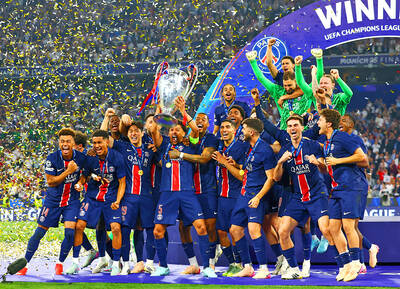
‘DREAM’: The 5-0 victory was PSG’s first Champions League title, and the biggest final win by any team in the 70-year history of the top-flight European competition Paris Saint-Germain won the Champions League for the first time as Luis Enrique’s brilliant young side outclassed Inter on Saturday in the most one-sided final ever with teenager Desire Doue scoring twice in an astonishing 5-0 victory. Doue supplied the pass for Achraf Hakimi to give PSG an early lead and the 19-year-old went from provider to finisher as his deflected shot doubled the advantage in the 20th minute. Doue scored again just after the hour mark, ending any doubt about the outcome before Khvicha Kvaratskhelia ran away to get the fourth and substitute Senny Mayulu, another teenager, made it five. Inter were
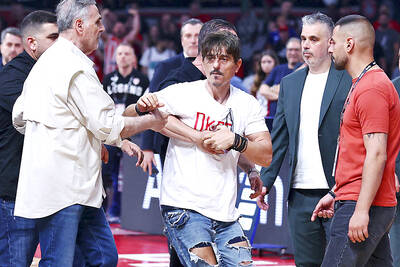
The Greek basketball league finals between Panathinaikos and Olympiakos were suspended by the government on Monday following on-court scuffles involving rival security teams. The best-of-five series is at 1-1. The third game, scheduled for today, has been postponed. The owners of both clubs were summoned to meet with the country’s sports minister. They “will be asked to provide explicit guarantees that this situation will be brought to an end. If not, this year’s championship will be definitively canceled,” government spokesman Pavlos Marinakis said. “There can be no tolerance for such pathological phenomena of violence and delinquency.” In online posts, the owners of Panathinaikos and
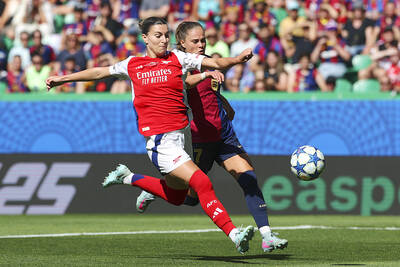
Defender Steph Catley says her UEFA Women’s Champions League title win with Arsenal last week will act as motivation to secure continental glory with Australia when the country hosts the Women’s Asian Cup next year. Catley and compatriots Caitlin Foord and Kyra Cooney-Cross were part of the Arsenal squad that defeated Barcelona in Lisbon on Sunday last week, before flying to Melbourne to feature in the Matildas’ 2-0 win over Argentina on Friday. The game was the first in a two-match series against the South Americans as the Australians continue preparations for the continental championship in March next year, when they would